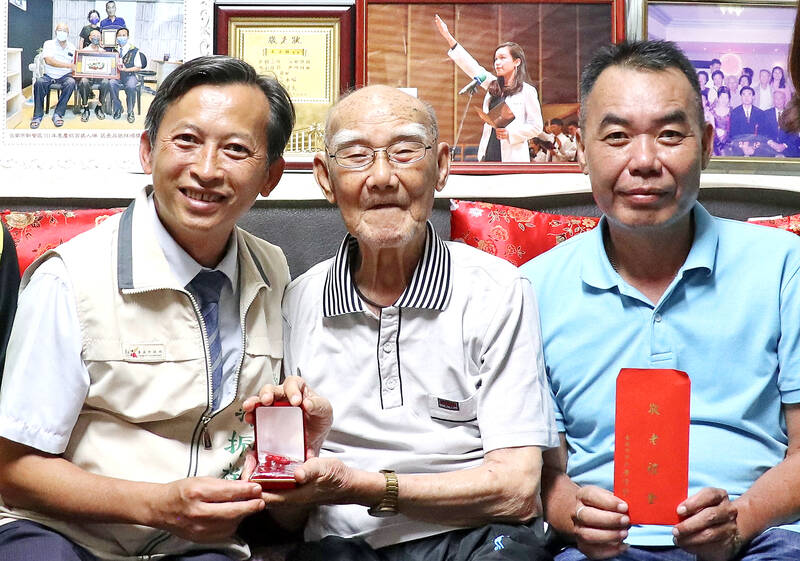The number of centenarians in Taiwan exceeded 5,000 for the first time last year and remained above 5,000 this year despite a small year-on-year decrease, Ministry of Health and Welfare statistics showed.
Last year there were 5,076 centenarians in the country, and there are 5,011 this year, which is 2.3 times the number recorded from 10 years ago, statistics showed.
A total of 3,036 of the centenarians in the country are women, accounting for 65 percent of the total, the data showed.

Photo courtesy of the Sinying District Office
A total of forty-five of those people are over 110 years old this year, with the oldest woman in the group being 119 years old, and the oldest man being 114 years old.
The statistics also showed that the average life expectancy in the country is rising, with men living to 76.63 years on average and women to 83.28 years.
Every year, the Presidential Office and the ministry hand out gold-plated medallions to those aged 100 or older, as well as commemorative certificates to those just turning 100.
The government this year budgeted NT$44.71 million for the purchase of the medallions, which was a new record, the ministry said.
“In the 1960s, the average lifespan in Taiwan was only about 45 years, but by the 1990s it grew to more than 60 years, and has now reached the 80s,” Executive Yuan Long-term Care Promotion Group convencer Lin Wan-i (林萬億) said.
“As we age, long-term healthcare becomes more important, and it is also important to keep a positive attitude and not be afraid of aging,” he said.
Ministry of Health and Welfare Deputy Minister Lee Li-fen (李麗芬), on Oct. 21 said that the government passed the “White Paper on an Aging Society” in 2021, hoping to build an “autonomous, self-reliant, integrated, and sustainable” elderly society.
“Under plans formulated last year, the government is to invest an estimated NT$120 billion over four years in building a self-reliant and resilient aged society,” she said.
“There is to be cross-governmental agency cooperation on the issue, which was first raised in a white paper in 2021.”
The government has established 4,633 community care centers nationwide to help the elderly, including 2,757 that are implementing the long-term 2.0 policy and providing preventive and delayed disability care services, she said.
“We eventually plan to have more than 7,000 long-term care facilities, which would provide services to the elderly, and allow people to eat meals together and participate in health promotion activities together,” she said.
It is still common in Taiwan for elderly people to be bedridden and dependent on others for up to eight years before they pass away, Taiwan Association of Gerontology and Geriatrics director-general Lee Lung-teng (李龍騰) said.
Authorities should work to foster healthy living habits from a younger age, which would also include financial planning for old age, he said.
In the future, long-term care policies would mean better facilities, but also outreach care services, accessible transportation and promotion of an active lifestyle, he said.

An essay competition jointly organized by a local writing society and a publisher affiliated with the Chinese Communist Party (CCP) might have contravened the Act Governing Relations Between the People of the Taiwan Area and the Mainland Area (臺灣地區與大陸地區人民關係條例), the Mainland Affairs Council (MAC) said on Thursday. “In this case, the partner organization is clearly an agency under the CCP’s Fujian Provincial Committee,” MAC Deputy Minister and spokesperson Liang Wen-chieh (梁文傑) said at a news briefing in Taipei. “It also involves bringing Taiwanese students to China with all-expenses-paid arrangements to attend award ceremonies and camps,” Liang said. Those two “characteristics” are typically sufficient

A magnitude 5.9 earthquake that struck about 33km off the coast of Hualien City was the "main shock" in a series of quakes in the area, with aftershocks expected over the next three days, the Central Weather Administration (CWA) said yesterday. Prior to the magnitude 5.9 quake shaking most of Taiwan at 6:53pm yesterday, six other earthquakes stronger than a magnitude of 4, starting with a magnitude 5.5 quake at 6:09pm, occurred in the area. CWA Seismological Center Director Wu Chien-fu (吳健富) confirmed that the quakes were all part of the same series and that the magnitude 5.5 temblor was

The brilliant blue waters, thick foliage and bucolic atmosphere on this seemingly idyllic archipelago deep in the Pacific Ocean belie the key role it now plays in a titanic geopolitical struggle. Palau is again on the front line as China, and the US and its allies prepare their forces in an intensifying contest for control over the Asia-Pacific region. The democratic nation of just 17,000 people hosts US-controlled airstrips and soon-to-be-completed radar installations that the US military describes as “critical” to monitoring vast swathes of water and airspace. It is also a key piece of the second island chain, a string of

The Central Weather Administration has issued a heat alert for southeastern Taiwan, warning of temperatures as high as 36°C today, while alerting some coastal areas of strong winds later in the day. Kaohsiung’s Neimen District (內門) and Pingtung County’s Neipu Township (內埔) are under an orange heat alert, which warns of temperatures as high as 36°C for three consecutive days, the CWA said, citing southwest winds. The heat would also extend to Tainan’s Nansi (楠西) and Yujing (玉井) districts, as well as Pingtung’s Gaoshu (高樹), Yanpu (鹽埔) and Majia (瑪家) townships, it said, forecasting highs of up to 36°C in those areas